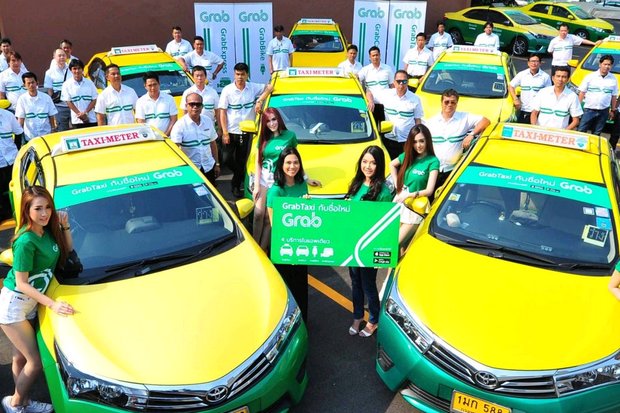
The Tourism Authority of Thailand (TAT) and the Land Transport Department will discuss legalising ride-hailing services like Grab as the state seeks to promote this year's tourism revenue target of 3.4 trillion baht, particularly in 55 secondary provinces.
Ride-hailing services are a key transport option in second-tier provinces that lack public transport for tourists, said Siripakorn Cheawsamoot, deputy governor for digital R&D at the TAT.
Tarin Thaniyavarn, country head of Grab Thailand, said tourists account for 20% of Grab's passengers in Thailand and it has services in Singapore, Malaysia and the Philippines that are supported by Alipay, which is highly popular with Chinese tourists.
Tourism makes up 20% of Thailand's GDP. Grab will transfer know-how from its Singapore data science team to the TAT and plans to increase driver supply in secondary provinces. Grab Thailand operates in 16 provinces and 18 cities.

TAT governor Yuthasak Supasorn (left) and Grab country head Tarin Thaniyavarn vow cooperation.
The TAT is partnering with Grab Thailand and investing 40 million baht in a smart data system with accuracy marketing.
"By signing a partnership agreement to use big data with Grab Thailand, we will be able to strengthen the tourism industry because transport is key to visitors accessing experiences and being able to spend," said TAT governor Yuthasak Supasorn.
Grab has data on tourist behaviour, such as preferences for pickup points and destinations that the TAT could use for analytic purposes. The data can be used for marketing to increase the number and quality of tourists.
"Our main goals are to have tourists revisit Thailand, increase new tourist numbers, distribute tourism income to secondary provinces and introduce new destinations to stimulate the market even further," Mr Yuthasak said.
Apart from exchanging data, the TAT will develop services and run a campaign with Grab.
The TAT will provide special rewards for Grab drivers who receive good reviews from tourist passengers. This will help to boost the image of transport in Thailand, long hindered by dishonest tuk-tuk and taxi drivers.
Mr Siripakorn said that starting last year the TAT spent 40 million baht on the Tourism Smart Data scheme by using data from the Immigration Bureau, National Statistical Office, Expedia.com and the Thai Meteorological Department.
With Grab's tourist insights, the TAT will be able to better promote travel to 55 secondary provinces because these areas lack data and public transport.
The TAT aims to increase revenue from 55 second-tier provinces to close the disparity in tourism revenue. This year Thailand is expected to gain 15% of tourism revenue from secondary provinces and 85% from major cities after gaining 90% from major cities and 10% from second-tier cities in the last two years. Some 70% of tourists go to major cities and 30% to second-tier cities.
Mr Yuthasak earlier disclosed the TAT's goal in 2019 to raise the travel industry's value to 3.4 trillion baht and increase foreign visitor growth to 10%.